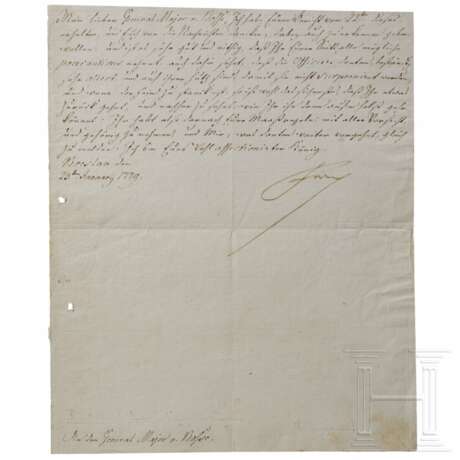König Friedrich II. von Preußen (1712 - 1786) - eigenhändig signierter Brief "An den General Major v. Bosse" aus dem Bayerischen Erbfolgekrieg, 1779
04.11.2024 10:00UTC +01:00
Classic
Starting price
950EUR € 950
| Auctioneer | Hermann Historica |
|---|---|
| Event location | Germany, Grasbrunn / München |
| Buyer Premium | 25 % |
Archive
The auction is completed. No bids can be placed anymore.

ID 1326134
Lot 654 | König Friedrich II. von Preußen (1712 - 1786) - eigenhändig signierter Brief "An den General Major v. Bosse" aus dem Bayerischen Erbfolgekrieg, 1779
Handgeschöpftes Papier (Maße 22,7 x 18,8 cm) mit handschriftlichem Diktattext in Tinte, datiert "Breslau den 29ten January 1779". Friedrich der Große mahnt den Kommandeur des Dragoner-Regiments Nr. 11, es sei "sehr gut und nöthig, daß Ihr Eurer Seits alle mögliche precautions nehmt, auch dahin sehet, daß die Officiers dorten, beständig sehr alert, und auf ihrer Huth sind, damit sie nicht surpreniret werden, und wenn der Feind zu starck ist, so ist wohl das sicherste, daß ihr etwas zurück gehet, und nachher zu sehet, wie Ihr ihn denn aufm Halß gehen könnet: Ihr habt also darnach Eure Maaßregeln mit aller Vorsicht, und gehörig zu nehmen, und Mir, was dorten weiter vorgeht, gleich zu melden. Ich bin Euer Wohl affectionierter König", mit eigenhändiger Tintenunterschrift "Frch". Am Unterrand Adressierung. Leicht fleckig, zwei kleine Heftlöcher.
Nach dem Tod des bayerischen Kurfürsten Maximilian III. Joseph 1777 und dem damit verbundenen Aussterben der bayerischen Wittelsbacher sollte das Kurfürstentum Bayern an die Linie Pfalz-Sulzbach der Wittelsbacher fallen. Kaiser Joseph II. von Österreich erhob jedoch Ansprüche auf Niederbayern und die Oberpfalz und marschierte im Januar 1778 dort ein. Friedrich der Große ließ daher seine Truppen im Juli 1778 in Böhmen einmarschieren. Dieser im Volk als "Kartoffelkrieg" oder "Zwetschgenrummel" bezeichnete Erbfolgekrieg war durch große Nachschubprobleme geprägt, weswegen die Truppen auf beiden Seiten Lebensmittel vor Ort requirieren mussten und militärische Auseinandersetzungen weitestgehend vermieden wurden.
Interessanter Brief, der die vorsichtige und auf Zurückhaltung ausgerichtete Taktik des preußischen Königs wunderbar widerspiegelt.
Friedrich II of Prussia (1712 - 1786) – a handwritten, signed letter addressed "An den General Major v. Bosse" from the War of the Bavarian Succession, 1779
Friedrich II of Prussia (1712 - 1786) – a handwritten, signed letter addressed "An den General Major v. Bosse" from the War of the Bavarian Succession, 1779
Handmade paper (measuring 22.7 x 18.8 cm) with handwritten dictation in ink, dated "Breslau den 29ten January 1779". Frederick the Great cautions the commander of the Dragoon Regiment no. 11 that it is (tr.) "very good and necessary that you take all possible precautions on your side, also seeing to it that the officers there are unfailingly on high alert, and on their guard, to ensure that they are not taken by surprise, and if the enemy is too strong it is probably safest to retreat a little, and afterwards see how you can overpower him. Therefore, you are to take your measures with all caution and as they are due, and report to me immediately whatever is going on there. I am your affectionate King", bearing his original signature in ink "Frch". The address on the lower edge. Lightly stained, two small staple holes.
After the death of Bavarian Prince Elector Maximilian III Joseph 1777, and the subsequent decline of the Bavarian House of Wittelsbach, the Electorate of Bavaria was to fall to the Palatinate-Sulzbach line of the House of Wittelsbach. However, Kaiser Joseph II of Austria laid claim on Lower Bavaria and the Upper Palatinate and invaded in January 1778. Therefore, Frederick the Great had his troops invade Bohemia in July 1778. This War of Succession, commonly dubbed the "Kartoffelkrieg" (Potato War) or "Zwetschgenrummel" (Plum Fuss), was marked by major supply problems, forcing troops on both sides to requisition food on the ground, which meant that military conflicts were largely avoided.
Fascinating letter, which perfectly attests to the cautious and reserved tactics of the Prussian King.
Condition: II -
| Auction house category: | Prussia: Ruling house of Hohenzollern |
|---|
| Auction house category: | Prussia: Ruling house of Hohenzollern |
|---|
| Address of auction |
Hermann Historica Bretonischer Ring 3 85630 Grasbrunn / München Germany | ||||||||||||||
|---|---|---|---|---|---|---|---|---|---|---|---|---|---|---|---|
| Preview | |||||||||||||||
| Phone | +49 (0)89 5472 649 0 | ||||||||||||||
| Fax | +49 (0)89 5472 64999 | ||||||||||||||
| Buyer Premium | 25 % | ||||||||||||||
| Conditions of purchase | Conditions of purchase | ||||||||||||||
| Business hours | Business hours
|


